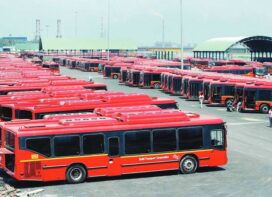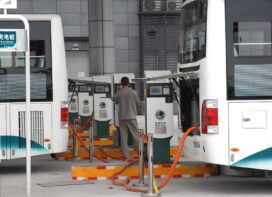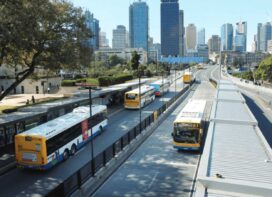 Charlotte Wäreborn Schultz, Managing Director, Swedish Public Transport Association, writes about the ‘Doubling Project’ which aims to increase the share of public transport in Sweden twofold
Charlotte Wäreborn Schultz, Managing Director, Swedish Public Transport Association, writes about the ‘Doubling Project’ which aims to increase the share of public transport in Sweden twofold
At the beginning of 2008, five organisations met to discuss the development of public transport in Sweden. These were the public transport trade organisations – the Swedish Public Transport Association, the Swedish Bus and Coach Federation, the Swedish Association of Local Authorities and Regions (SALAR), the Association of Swedish Train Operating Companies and the Swedish Taxi Association. They agreed on a common vision and a joint goal scenario and created the Doubling Project.
The vision of the project is that “public transport is a natural part of travel in a sustainable society” and its goal is to double the share of the market held by public transport. In order to be able to achieve the vision, public transport needs to be so attractive and competitive that people, each day, have a real possibility to choose it in preference to their own cars.
So, why did we decide to double the share of the market held by public transport? Because, the project will help us achieve extremely important social goals for the environment, employment, road safety and equality. For example, a doubling of public transport in Sweden would reduce the emissions of carbon dioxide from passenger transport by just over 20% and provide a socio-economic benefit of some €4 billion.
In 2008, the Doubling Project was presented to the Ministry of Enterprise, Energy and Communications. We emphasised that we were prepared to shoulder our share of the responsibility for doubling public transport provided the State was willing to create the necessary preconditions. In the final instance, the role of the State is of decisive importance for our success since it decides, for example, on what investments need to be made in the infrastructure and on national tax issues.
 In order to prove our credibility in relation to the State, our work on the first major sub-project within the Doubling Project was very important. We were forced to establish that the sector could work well together, deliver results and not simply make demands on the State. In the spring of 2009, the sector presented a report titled “Business Model for Doubled Public Transport” as input for a discussion on how public transport should be developed in order to be able to double the market share. This model proved to be a very important source of input in the work being carried out by the Swedish Government at the time of drawing up a new Public Transport Act. The new Act was presented by the Government in 2010, and was found to concur to a large extent with the sector’s own model. The Act, which comes into force in 2012, means that regional and local public transport will take a giant step towards deregulation. Long distance public transport has already been deregulated.
In order to prove our credibility in relation to the State, our work on the first major sub-project within the Doubling Project was very important. We were forced to establish that the sector could work well together, deliver results and not simply make demands on the State. In the spring of 2009, the sector presented a report titled “Business Model for Doubled Public Transport” as input for a discussion on how public transport should be developed in order to be able to double the market share. This model proved to be a very important source of input in the work being carried out by the Swedish Government at the time of drawing up a new Public Transport Act. The new Act was presented by the Government in 2010, and was found to concur to a large extent with the sector’s own model. The Act, which comes into force in 2012, means that regional and local public transport will take a giant step towards deregulation. Long distance public transport has already been deregulated.
The Group involved in Doubling Project has now been joined by the Swedish Transport Administration. We are extremely delighted with the Swedish Government’s decision that the country’s most important transport authority should play an active role in the Doubling Project.
Most sub projects concern the sector’s own work. For example, promises to customers, contract processes and environmental programmes. But it can also be seen that certain sub projects are concerned directly with those issues for which the State is responsible like infrastructure, taxes and laws. The sub project, “Knowledge Lift” is very important for determining how we succeed in shifting from being a national project “with many words” to becoming a regional and local project with many ”workshops”. It is not the national trade organisations that will be responsible for doubling the public transport but rather the transport operators and local authorities in the country are the ones who will be doing it.
There needs to be a shift in our sector from a production culture to a service culture. The purpose of “The Knowledge Lift” is to increase the level of insight and knowledge within the sector on why it is necessary to orient customers to public transport and results. A number of activities are, therefore, being arranged within this sub project inclusive of national and regional think tanks, management courses and seminars. During the past two months, six regional think tanks have been held, the focus of which was the new Public Transport Act!
There are also a number of independent projects in progress all over the country with the aim of increasing public transport. We spread information on best practice from various towns and regions where it has been possible to bring about a significant increase in travel by public transport.
 TrafficInfraTech Magazine Linking People Places & Progress
TrafficInfraTech Magazine Linking People Places & Progress


